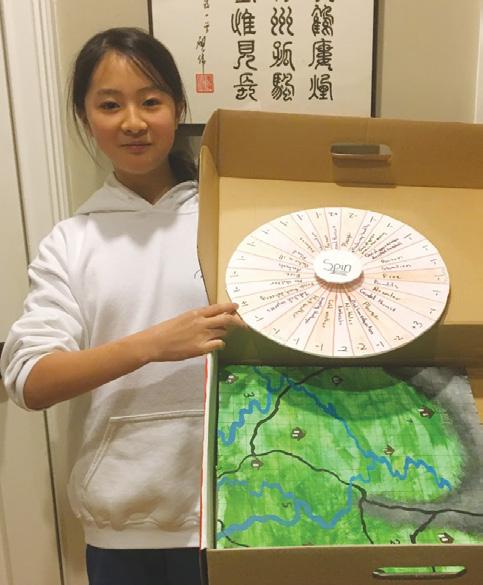
4 minute read
Emerging Curiosities from SEEK to STEM
Have you ever wanted to search for evidence of exoplanets? Maybe you would like to design a game based on ancient Chinese war strategy. Or perhaps you are interested in the effect of fatigue on bone composition. At Harpeth Hall, students explore and analyze these topics and much more. Through Harpeth Hall’s SEEK and Honors STEM Research programs, students pursue academic interests outside of the classroom to enrich their understanding of the world around them. These innovative programs encourage interdisciplinary modes of thinking to help students develop knowledge, empathy, and the capacities with which to act. They provide the opportunity to build on the academic foundation in the classroom and apply it in real-world situations that will help them thrive in college and beyond. It begins with curious, question-filled Middle School students. The Scholars Engaged in Extending Knowledge (SEEK) program gives seventh and eighth grade students space to explore. In SEEK, a student first enters the program with the desire to know more about a topic not covered in the Middle School curriculum. She works with a faculty mentor or an expert in the field who helps her formulate questions and guide her research. All SEEK scholars complete a final product, such as a research paper, a publication, a performance, or an original composition that they present to the SEEK faculty committee, as well as the Middle School student body.
Harpeth Hall’s 2019-20 SEEK scholars covered topics, from “Epilepsy and Learning” and the “Challenges of Building and Operating an Animal Shelter” to “Promoting Harpeth Hall Through the Eyes of a Student.” The students’ tenacity and passion persisted even as new scientific challenges emerged in the world around them with the COVID-19 pandemic. In their pursuit of learning, Garen Eadie, the Chair of the SEEK Committee, remarked that the SEEK Scholars showed “true grit and flexibility during an unprecedented time this spring." “You have much to be proud of and much to celebrate,” she told them during a virtual recognition assembly this past spring. From SEEK to STEM, Harpeth Hall offers students the opportunity to build on their emerging curiosities. In the Upper School, select juniors and seniors deepen their scientific knowledge through the Honors STEM Research course. Qualified students work at local research laboratories and present their scientific findings at two regional science and engineering fairs in the spring. The course enhances personal development by providing students an opportunity to navigate a university setting, work as part of an academic research team, and communicate results effectively to the scientific community and the general public. During the 2019-20 school year, 14 juniors and seniors were placed at laboratories at Vanderbilt University and other organizations across Nashville. Last spring, each student was recognized for her hard work and her cutting-edge research on topics including “Characterizing the Relationship Between Biological Factors and Cervical Spine Cord Metrics Using Magnetic Resonance Imaging (MRI)” and the “Effect of Fatigue-Induced Micro-Damage on the Raman Spectra of Bone.” The SEEK and Honors STEM Research programs allow students to build upon the academic foundation learned at Harpeth Hall in real-world situations that will help them thrive in college and beyond.
2019-20 SEEK Projects
• “Epilepsy and Learning” by Quinn Erim ’25 • “Post-Impressionism” by Anna Cate Graham ’25 • “Challenges of Building and Operating an Animal Shelter” by Clara Scott Harden ’25 • “The Power of Growth Mindset” by Elizabeth John ’24 • “Game Design Based on Ancient Chinese War Strategy” by Reika Nakagawa ’25 • “Fusing Flavors: A Guide to Blending Southern and Indian Cuisine” by Taylor Perkins ’24 • “Lapis Lazuli in the Ancient World” by Anaya Singh ’24 • “Promoting Harpeth Hall through the Eyes of a Student” by Mary Jackson Tatum ’25 • “Searching for Evidence of Exoplanets” by Lily Anne Thompson ’25 2019-20 Honors STEM Projects
• “Calcium Isotopes in Stalagmites as a Quantitative Precipitation Proxy for Comparison to Instrumental Records” by Annie Stewart ’21 • “Physiological and Behavioral Indicators of Stress in Children with Autism Spectrum Disorder” by Macy Gilmour ’21 • “Characterizing the Relationship between Biological Factors and Cervical Spinal Cord Metrics Using Magnetic Resonance Imaging (MRI)” by Sarah Cook ’21 • “Predicting E. coli Levels in the Harpeth River Watershed” by MacKenzie Higgins ’20 • “Comparing Two Methods of Attenuation Coefficient Extraction for the Retinal Nerve Fiber Layer from Optical Coherence Tomography Data for Glaucoma Assessment” by Clara Murff ’21 • “Electrochemical Evaluation of Novel Nanoscale Materials for Water Desalination” by Devon Campbell ’21 • “A Comprehensive Investigation into Nanodevices” by Megan Robertson ’20 • “Developing Polymeric Nanoparticles for the delivery of Poly (I.C.) to TLR3 and MDA-5 for Innate Immune Activation” by Belle Huang ’21 • “Identifying Transcriptional Regulators of Gap Junction Specificity in C. elegans” by Sydney Heifner ’20 • “Finding Ideal Locations in Tennessee to Plate Trees Using Data Collection and Analysis” by Caroline Harwell ’20 • “Restoring the Greenfield Site to its Fullest Potential” by Martha Milek ’20 • “A Comprehensive Review of Past Research Studies that Utilized Reinforcer Assessment Protocols to Generate Research Question Answers” by Eleanor Rankin ’20 • “Effect of Fatigue-Induced Micro-Damage on the Raman Spectra of Bone” by Jessica Ross ’20










